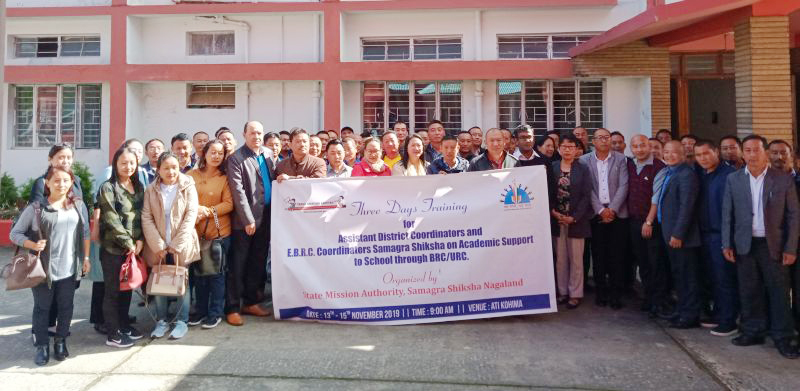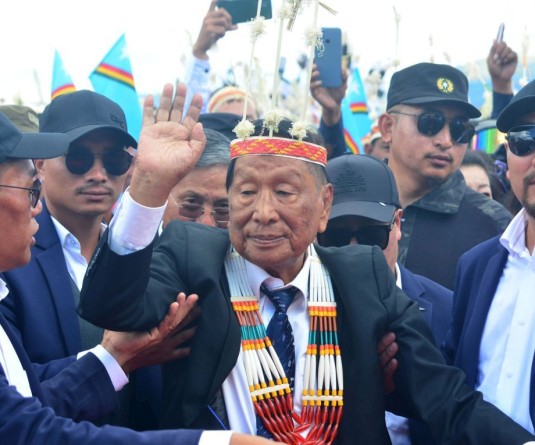‘VEC/SMC shall act as a facilitator and not dictator’

Dignitaries with the participants of the training programme on November 13. (Morung Photo)
Our Correspondent
Kohima | November 13
A three-day long training programme for assistant district coordinators and EBRC coordinators Samagra Shiksha on academic support to schools through BRC/URC got underway here today at ATI under the aegis of Nagaland Education Mission Society, Samagra Shiksha Nagaland.
Speaking at the introductory session, School Education Principal Director, Shanavas C said that there are about 20,000 government teachers in the state.
He stressed on the need to properly utilize the service of the teachers, adding that “we have qualified teachers” and there is no dearth of qualification of teachers in Nagaland. In this, he said qualification should turn into quality.
To bring quality education, he said we should start monitoring the teachers. The Principal Director also stressed on the need to have proper coordination to bring about overall improvement and quality education in the state.
Samagra Shiksha State Mission Director, Kevileno Angami said the training has been initiated to provide alternate mentoring, inspection and to improvise quality education.
As per NITI Aayog education data, she said Nagaland stands at the 3rd (from the bottom) while Nagaland state has a record of more that 80% literacy rate.
To this, she said education and literacy has different meaning and state cannot be complacent of being educated because children were not educated.
She made comparison between the government and private institutions stating that there were huge differences in terms of salary and teachers-students ratio where for government, the teachers students ratio was 1:8, national ratio was 1:25 and private institution was 1:40.
Asserting that 1:8 was supposed to be giving private tuition, she however said private school results are much better.
She also stated that people at the block are critical in the service delivery of education and asked to change their attitude, find self potential and provide quality education instead of shifting the blame and responsibilities to others.
School improvement and transformation
Timothy Thong, deputy mission director Samagra Shiksha Nagaland in his keynote address said that creation of the Block Resource Centres, Cluster Resource Centres and the Urban Resource Centres on a large scale throughout the country represents an ambitious effort to provide academic structures that support and improve the quality of education in schools.
They were initially set up under the District Primary Education Programme, which was implemented in a phased manner in selected districts of the country, and later expanded through Sarva Shiksha Abhiyan (SSA). They were seen as providing an alternative to inspection system by shifting emphasis from inspection to resource support, in-service training of teachers, mentoring, onsite support and training follow up.
He said that in the context of Right to Education (RTE), these institutions assume more importance as the RTE is a commitment to the provision of quality education to all.
He said that RTE require the state to ensure, oversee and regulate the provisioning to quality infrastructure and teaching learning processes, to ensure that all children achieve their potential through education.
The need for data has also grown with the addition of DISE and quality monitoring efforts. In this scenario, many states are confronted with the need to revisit their vision for BRPs/URPs.
“The increase in enrolment and completion of elementary school will also bring with it the enlargement of secondary schools,” he said adding that the institutions of BRC and CRC/URC, which till now had an elementary school focus, could include secondary schools into their ambit.
Therefore, the role of BRC/URC is a mixed set of academic, supervisory, managerial, networking and creative activities. It goes beyond routine monitoring and supervision work as it encompasses providing support to schools and teachers through teacher training and teacher mentoring for their professional growth, Thong added.
The training programme will go on till November 15.
‘Academic supervision and monitoring’
Talking on the topic “Academic supervision and monitoring,” Razouseyi Vese, additional director, School Education said that teachers in the past were not well equipped/professionalized. Nevertheless, with their zeal, initiative, dedication, sincerity and sacrifices made, produced good number of leaders, bureaucrats, physicians, educationists and thinkers etc.
“However, the present scenario of government run schools is of a contrast. Therefore, to the bring back the past glory, the department needs to adopt strategy in the area of monitoring and supervision so as to achieve goals at all level in the educational set up,” Vese said.
She said that the academic supervision & monitoring exercise is to inspect whether quality teaching learning process is carried out in schools to assess the learning outcome of the student, to get first hand-knowledge about whether, the various schemes/facilities extended to schools/offices are properly put in to use as per the norms, to understand and provide remedy for the problem faced by the field officers/Principals/Headmasters/Teachers/Students.
Vese felt that at the Directorate level, a strong academic cell need to be set up where the cell will inspect all district, HQ and sub division including some schools.
For school authority, the additional director felt that proper daily time table be made prior to start of new academic session, monthly academic review meeting at the end of the month and ensure that remedial measures is done for weak and slow learners, career guidance & counseling programme be organized at least once in a year, morning assembly be made mandatory at school in order to give a chance to explore their hidden talents, develop speaking skills etc.
On teachers, Vese said that teachers should be well versed with the syllabus, subject matters, mark distribution, question pattern and evaluation pattern and to equip with modern technology.
“Teachers should be responsive in shouldering any kinds of responsibility as and when assigned by the head,” he said.
He said that corporal punishment be avoided (As per the guidelines of RTE Act 2009) instead, a conductive class environment be created for enjoyable learning.
He also felt that the principle of “No Work No Pay” should be applied on erring teachers.
“Be responsive to the needs of the school in the matter of infrastructural/development and judicious used of school grants in consultation with the head and staff of school,” he said.
VEC/SMC shall act as a facilitator and not act as dictator, he added.
He also stressed on the need to recommend excellent or outstanding teachers to the authority for award.





